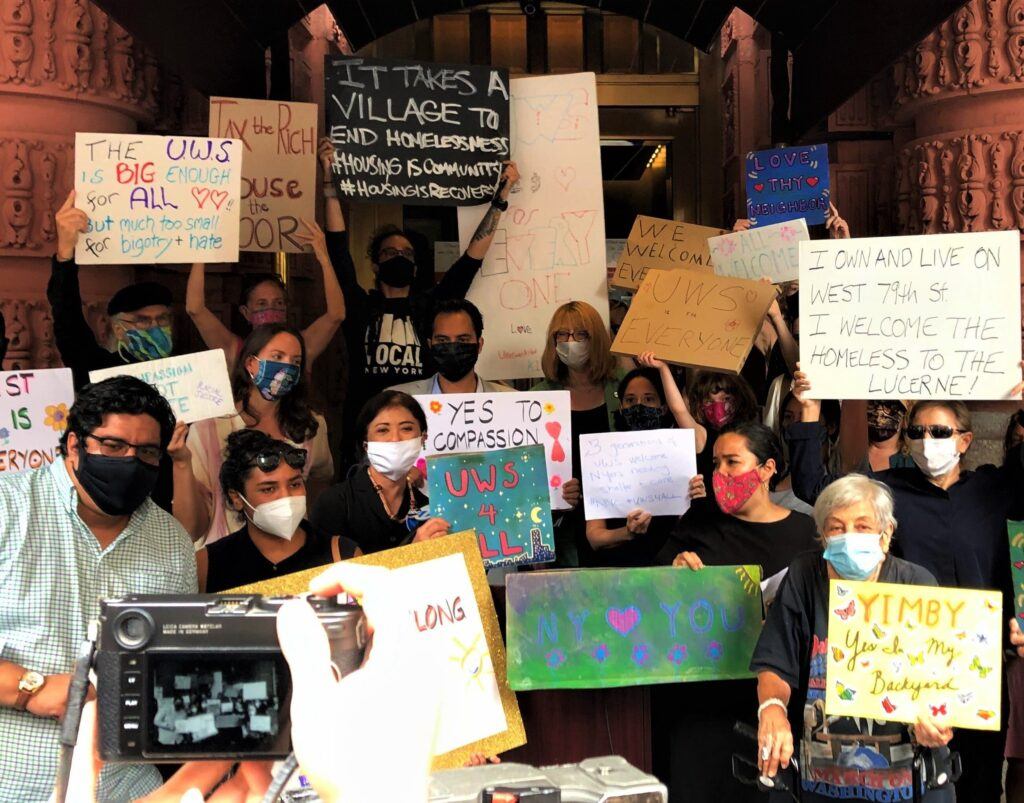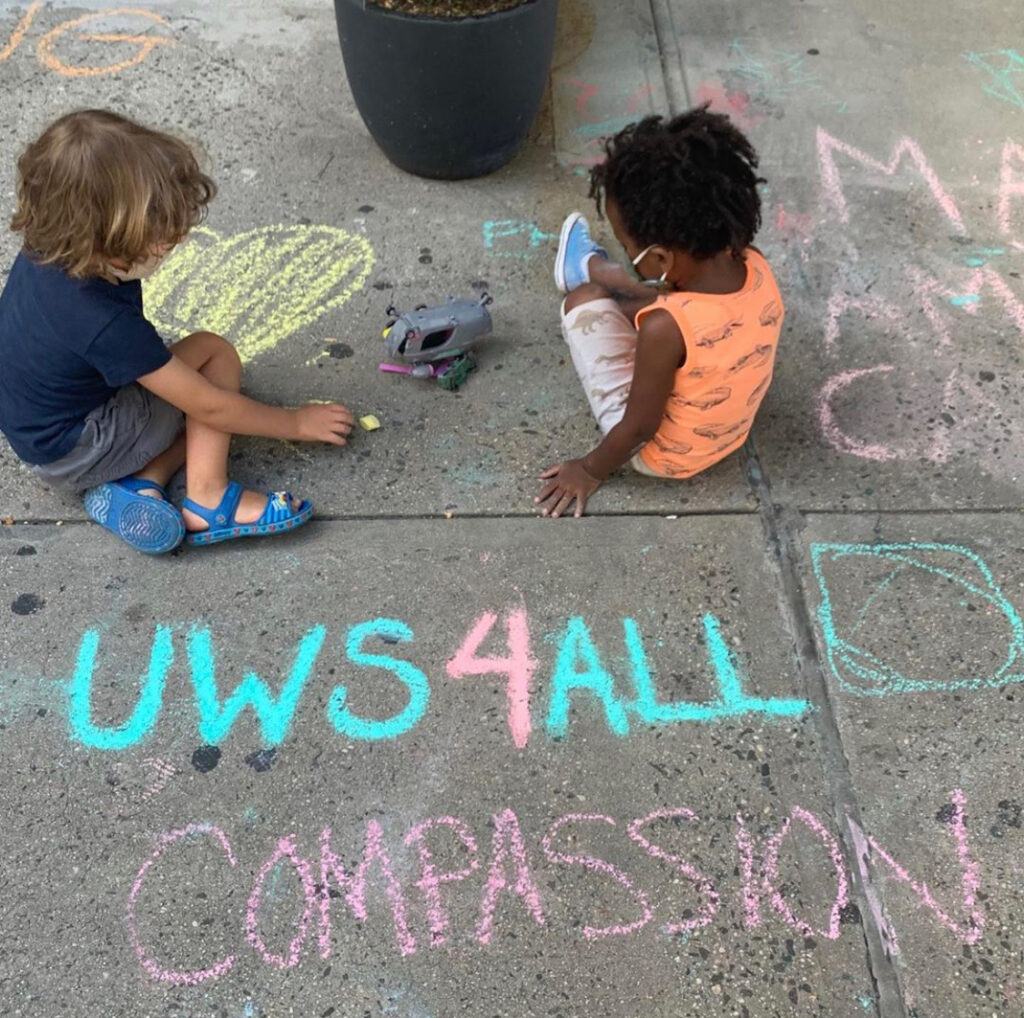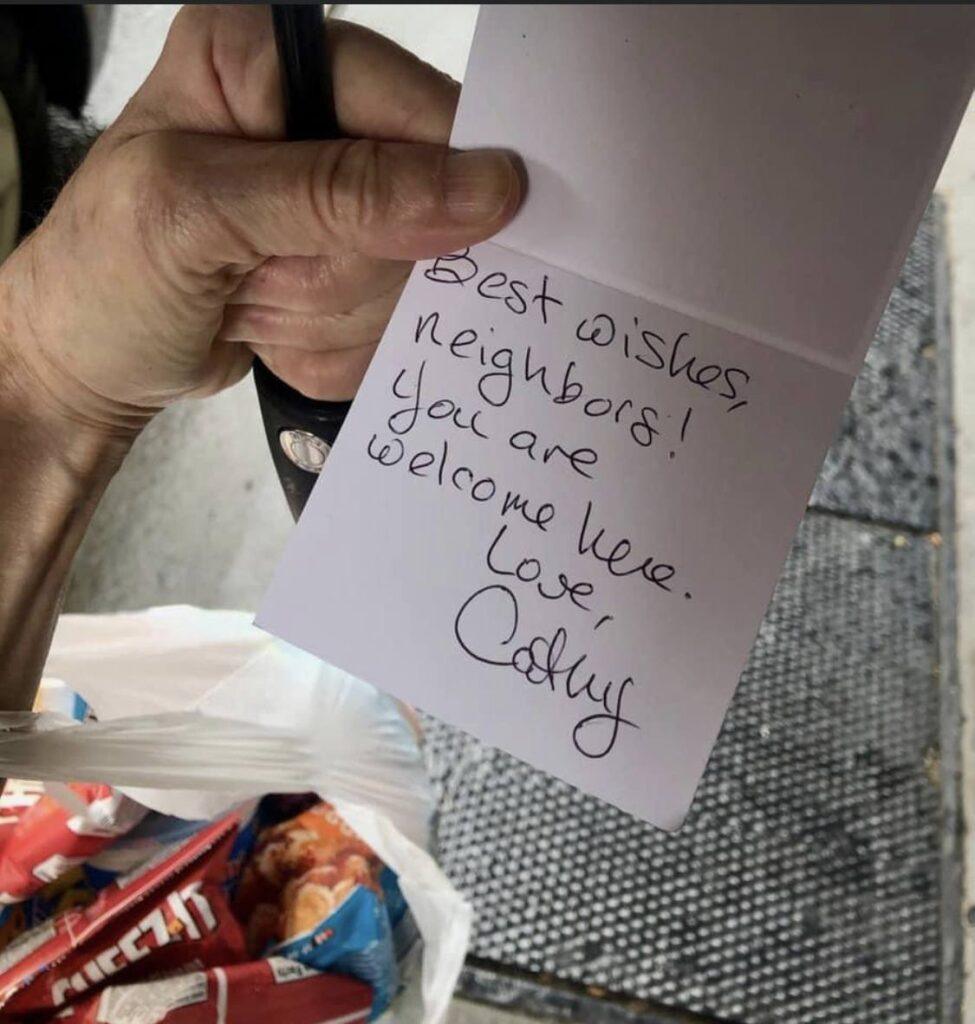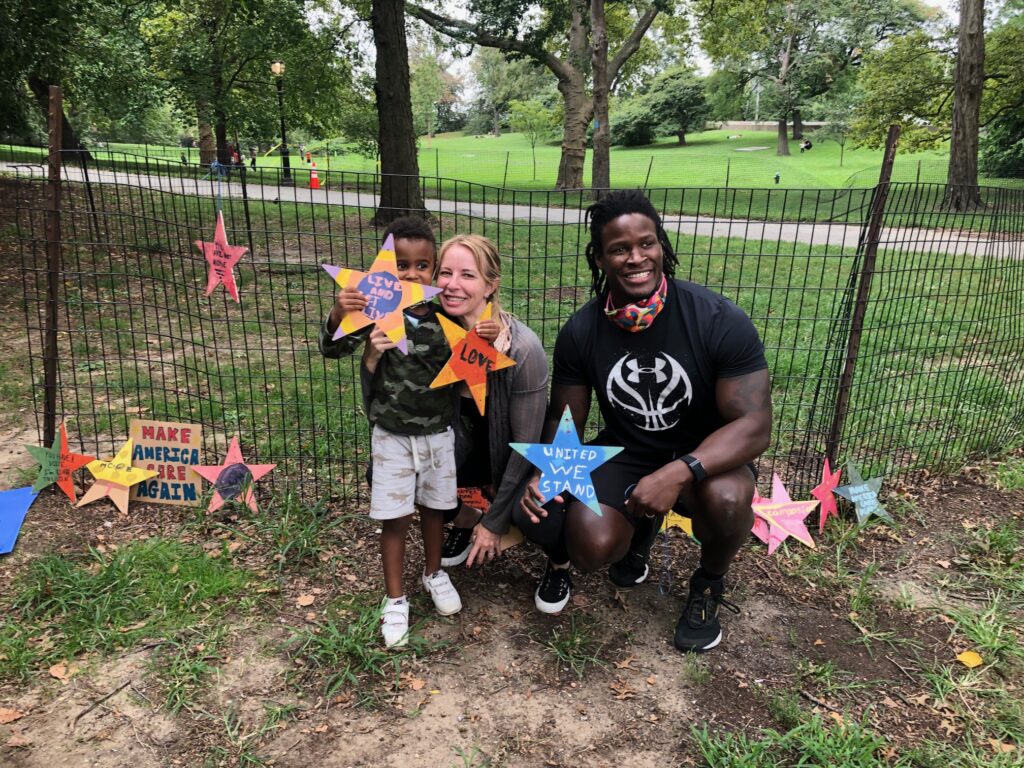Compassionate Communities Award
2020: Upper West Side Open Hearts Initiative
For those who have been reading the news lately, it might seem counterintuitive that the Coalition for the Homeless is recognizing a group from the Upper West Side with our fifth annual Compassionate Communities Award.
When the COVID-19 pandemic hit New York City earlier this year, the City undertook efforts to move homeless adults out of congregate, dorm-style shelters into hotel rooms around the city so they would be better protected from the virus. A few of these hotels are located on the Upper West Side, where the resistance was swift, loud, and well-funded. Some people complained on social media and to the press about an apparent decline in “quality of life,” and pooled their resources to hire a lawyer who threatened to sue the City unless the homeless New Yorkers were booted out of the hotels and out of the neighborhood. On September 8th, Mayor de Blasio inexplicably capitulated to the vocal anti-shelter group and announced he would be moving homeless men out of the Lucerne Hotel. The outcry from advocates, other City and State elected officials, and the more compassionate members of the community succeeded in delaying the move, but on September 25th, the City announced it would soon transfer men out of the Lucerne and into another hotel downtown. The situation has been traumatic and demeaning for the men residing in the Lucerne. It might also have succeeded in making the Upper West Side the de facto epicenter of NIMBYism, were it not for the efforts of another neighborhood group.
Amidst all of the uproar, a number of Upper West Side residents were coming together with a very different message – welcoming and supporting their new homeless neighbors. The mighty group of volunteers from the Upper West Side Open Hearts Initiative have organized rallies, art events, donation drives, and press conferences since they launched the initiative in the middle of August, right as the anti-shelter sentiment was reaching a boiling point. Their tremendous energy and organizing in support of people experiencing homelessness in the midst of a public health crisis – and in the face of vociferous hostility from some of their neighbors – is an example of compassion for all communities.

This past summer, the Upper West Side community was abuzz with news of homeless people moving in. Melissa E. Sanchez, who would later become the co-chair of Open Hearts’ Community Engagement Committee, first heard that homeless people had moved into a few hotels in the neighborhood through a local news website. She did not think much of it until her son’s elementary school emailed to urge parents to call for homeless people to be removed from the neighborhood. “I realized that I had a choice: I could stand up to rhetoric criminalizing an entire population, or I could keep quiet and be complicit with it,” she said. “To me, this was no choice at all.” She dropped everything and spent the day writing to representatives and media outlets to register her strong support for the City’s decision to protect its most vulnerable residents from COVID-19.
Fellow Upper West Side resident Corinne Low also felt compelled to speak out against the heated anti-shelter sentiment. “To be honest, I was shocked by the closed-heartedness of my neighbors, who, for the most part, were insulated from the worst of the COVID pandemic and the current economic crisis, and yet were now demanding that the shelters be moved, and thus that people living in shelters be exposed to deadly risk and conditions they have never had to deal with, based on their own comfort,” Low said. “I needed to make a strong stand based on my values.”
Amanda Fialk, who would become co-founder of the Open Hearts Initiative, unwittingly catalyzed the group’s formation when she worked with the All Street Journal to organize a sidewalk chalk event in front of the hotel shelters. The event was a success: “Shelter residents told us how much seeing those messages brightened their days while they faced being glared at by other UWS residents,” said Low, who brought 50 care packages she had assembled with her family to the event. Recognizing the power of community compassion, Low, Fialk, and Heather Gunn-Rivera, a business owner on the Upper West Side, began to discuss more formally organizing neighbors in support of the shelters. “Our immediate goal was to support the shelter residents by showing them that there were neighbors that cared about them, and welcomed them into our neighborhood, while at the same time advocating for their needs and rights,” Gunn-Rivera said.

The chalk-writing event was also comforting for neighbors who supported the shelters, as they found other people who shared their views. “I’d felt alone in my efforts to speak out against the misinformation and anger spreading in our neighborhood, and it was a relief to find like-minded neighbors who acted based on facts and compassion,” Sanchez said.
Zoom calls turned into a Faceboook group, which turned into a volunteer-run organization that became known as the UWS Open Hearts Initiative. “The power of one person opening their heart and helping is great,” Fialk said. “More so the power of three, 10, 50, and now an entire Open Hearts Initiative. We understand that a community is safe when the community is grounded in values of empathy, compassion, equity, justice, and kindness.”
Having found other compassionate neighbors, the group got to work to support the shelter residents and combat some of the misleading information that the opponents had been spreading about the hotels. They launched a website with an open letter to City officials and facts about the services in the hotel shelters and the systemic causes of homelessness. They organized several events, from rallies and marches to a solidarity sleep-out in front of the Lucerne. They also formed committees to draw on members’ diverse strengths, from community outreach to policy advocacy. They reached out to the nonprofit shelter providers operating out of the hotels, such as Project Renewal, and asked how the community could help support residents. They then organized online shopping wish lists for the shelters, and helped to source and sort in-kind donations from the community to avoid creating extra work for shelter staff. Recognizing that many shelter residents are working or seeking employment, they also launched resume workshops and a MetroCard drive, and hope to hold employment fairs for shelter residents. The group has found the most impactful events to be those that bring the shelter residents and Upper West Siders together, such as a “Free Store” where shelter residents could select from donated items, or the “Soulful Sunday” walk and talks with local faith leaders.
“Since coming to the Upper West Side community and experiencing a negative backlash from a small minority of community residents, it was refreshing for there to emerge a bigger group, under the banner of UWS Open Hearts Initiative, that showed me and my fellow residents what love is in every sense of the word,” said a Lucerne resident who goes by the moniker Da Homeless Hero. “As a person who is affected by generational trauma, I am grateful for the expression of love and support presented by the UWS Open Hearts Initiative and look forward to continuing to work with them to make our experience in this community a healthy and beneficial experience.”
Low said the group is trying to do whatever it can to make life a little easier for the people experiencing homelessness in the hotels. “We’ve heard this pernicious phrase repeated over and over: ‘quality of life issues,’” she said. “And what is meant by that is a tiny decrease in comfort for people living privileged lives. So we wanted to bring the focus back to shelter resident quality of life, and see how we could improve that.”

The group’s work has made a challenging period better for the shelter residents and for those who work with them, even though unfortunately the City is now planning to remove them from the Lucerne. “The UWS Open Hearts Initiative has been a tremendous partner to Project Renewal and our clients to whom we provide shelter, healthcare, and social service,” said Jody Rudin, the Executive Vice President and Chief Operating Officer of Project Renewal. “In addition to welcoming our clients to the community with compassion and generosity, they have been fierce and effective in their advocacy. Acting as the Upper West Side’s conscience, they have mobilized support for our program and for others experiencing homelessness in the neighborhood. We are deeply grateful for their work, which represents the best of New York City.”
The Open Hearts’ multifaceted efforts are particularly impressive given that the city is still in the midst of a public health crisis. Open Hearts members, however, say the chaos of the pandemic and the long-overdue national reckoning with systemic racism made their activism even more vital because it highlighted the gap between people who had housing and those who were weathering the crisis without the stability of their own home. “Like most of my neighbors who had already been living on the Upper West Side, I have a safe place to quarantine and plenty of food and supplies, and still will on the other side of a prolonged financial downturn,” said UWS Open Hearts Initiative member Michelle Swan. “The presence of our new neighbors made me distinctly aware of how unfair it is that many New Yorkers don’t have those luxuries, let alone basic safety nets and access to housing that is realistically affordable in a healthy economy. Of course we should welcome them like any other new neighbors.”
One of the group’s many initiatives is a Housewarming Committee, which collects items to help shelter residents who are moving into permanent housing. “We want the resident to feel the love in each item, and I think that is accomplished by our community,” said Carla Dunn, the head of this committee. “The only thing we wish is that we were getting more requests for housewarmings – we have many neighborhood residents standing by to help out, but these moves to permanent housing are all too slow in coming. The issue is that there is a real lack of affordable housing accessible to shelter residents, whether supported or independent.”
Unfortunately, some of their Upper West Side neighbors continue to oppose the shelters, and the residents of the Lucerne will soon be moved out to appease this segment of the neighborhood. But the UWS Open Hearts Initiative is committed to open dialogue with people who are reacting based on fear and stereotypes rather than with empathy. “Our hope is that by being open, compassionate, and fact-based, we can help change minds, attitudes and ultimately policy regarding our homeless population and our neighbors,” said Kate Epstein Mankoff, co-chair of the group’s Media/Communications Committee.
Shelter residents have expressed their appreciation for the group’s work, which has shown them that the voices of intolerance do not speak for the entire neighborhood.
“In a time of darkness, despair, and uncertainty, UWS Open Hearts have become a beacon of light for hope,” said Larry Thomas, who has been staying at the Lucerne.
“UWS Open Hearts Initiative brought together local residents, clergy, and advocates to support the men and women who left their congregate housing to live temporarily in Upper West Side hotels so that they would be less likely to get and spread COVID-19,” said Manhattan Borough President Gale A. Brewer. “Their rallies and outreach effort raised the spirits of the hotel residents and staff who felt unwelcome in the neighborhood. I congratulate them on receiving the Compassionate Communities Award from the Coalition for the Homeless.”
“I send my warmest congratulations and gratitude to the UWS Open Hearts Initiative upon their receipt of the Compassionate Communities Award,” said Council Member Helen Rosenthal (Manhattan, District 6). “They greatly deserve this recognition from the Coalition for the Homeless, and from all of us. The homelessness crisis in New York City will only be solved when every New Yorker embraces the truth that people experiencing homelessness are our neighbors, and deserve our full support. UWS Open Hearts has lived this truth with great courage and compassion, and I thank them.”
Whatever happens to the residents of the Lucerne and other hotels in the neighborhoods, the UWS Open Hearts Initiative members hope they can inspire other communities to react to the news of a shelter opening nearby with empathy and a welcoming spirit. “We hope other neighborhoods will follow our lead, and find ways to activate the compassion among neighbors that often goes unstated, while anger and fear speak loudly,” said Nikola Pavelic, an Upper West Side resident who serves as the co-chair of Open Hearts’ Policy Advocacy Committee. “Since starting this we’ve seen an outpouring of support from compassionate neighbors who didn’t know where to channel their sentiments.”

Here are tips from the UWS Open Hearts Initiative for other neighborhoods looking to help out when shelters move in and face opposition:
1) Organize a group of caring, compassionate, and action-oriented local resident volunteers committed to ensuring that the neighborhood responds in a humanizing, productive, and supportive way. Ensuring you recruit volunteers from within your neighborhood will help with getting more volunteers involved as well as any pushback rooted in the ‘outsiders’ narrative. Create a social media group for volunteers to coalesce, and manage the volunteer work without overwhelming any one leader by establishing volunteer committees like the ‘Housewarming Committee’ or ‘Communications Committee.’
2) Inform the work of your group based on the actual needs of the shelter residents and staff. By introducing a few volunteers of the group to the local shelter staff and asking how you can be of service, you will be taking action that is actually meeting the needs of the shelter staff and residents. Assign a contact point for each shelter for things like updating wish lists or keeping up to date on resident move-outs for housewarming packages. Develop resident contacts and be responsive to their requests – when Lucerne residents told us one of their greatest needs was for spiritual services, we teamed with local clergy to arrange non-denominational outdoor ‘walk and talk’ faith sessions.
3) Push out news and calls to action to like-minded folks through a newsletter and social media, while also combatting community misinformation through a public-facing website (for us, this was UWSStrong.org, which we pictured as having an audience of someone ‘on the fence’). Make sure that the facts presented on the website are relevant to the neighborhood and informed by the local shelter and any other credible partners, providing real information on things like crime, the density of shelters in other areas, protecting children, etc. Be intentional about calling out racism and classism or other problematic narratives that inform the discourse. Insist on having a conversation rooted in empathy, compassion, and facts.
4) Organize events that will get both shelter residents and community members engaged. One of our most successful events has been the Free Store outside the local shelters, because it was a win for everyone. Community members like knowing their items will go to someone else who will treasure them, and shelter residents get to select exactly what they want, rather than being stuck with whatever they’re given. Direct engagement between the community and shelter residents completely transforms the dynamic.
5) Surround the volunteers with groups and organizations who have been addressing needs around homelessness for years. For us, this meant having open lines of communication with our local elected officials, advocacy groups, and service organizations so that we could quickly and effectively coordinate information and action. We planned events and demonstrations together, and tried to fill a gap – mobilizing grassroots community support – rather than duplicate effort.
6) Be intentional about your public audience, whether policymakers or New Yorkers in general. Getting news of your events out to the media can help dispel the myth that all neighborhood residents oppose shelters. Moreover, it’s important to make this support known to local elected officials, so they know they have allies in supporting shelters. We communicated directly to the Mayor by organizing a public letter, and later teamed with elected officials on press conferences to get our message out to a broad audience.
Past Recipients
2019: Clinton/Hell’s Kitchen and Chelsea, Manhattan
2018: Northwest Bronx
2017: Elmhurst, Queens
2016: Kensington/Windsor Terrace, Brooklyn
Be a Compassionate Community
Here are some first steps you can take to transform your neighborhood into a welcoming, compassionate place for all New Yorkers:
- Find answers to frequently asked questions on how to help homeless individuals and families that you encounter in your community.
- Join our online community and receive monthly news on homelessness in NYC, updates on the Coalition’s advocacy efforts, and ways you can get involved and take action.
- Follow us on Twitter, Facebook, and Instagram to see our work in action every day and learn how to help.
- Support our 11 frontline programs that help 3,500 homeless New Yorkers each day with emergency services, food, job training, housing, and more.
- Click here to learn about volunteer opportunities, events, drives and sponsorships, easy advocacy actions, and other ways to take action.